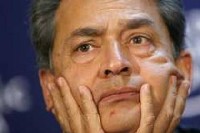While the former managing director of McKinsey & Co, Rajat Gupta, has every right to claim that he is innocent until otherwise established in a court of law, he must adopt the same standards of good conduct in India as he has been required to in the US. If Mr Gupta chose to step down from the boards of various institutions he has been associated with in the US, he must do the same in India.
If Mr Gupta chose to step down from the boards of various institutions he has been associated with in the US, he must do the same in India.
Mr Gupta must step down as chairman and managing director emeritus, Indian School of Business (ISB) and chairperson, Public Health Foundation of India (PHFI).
Can there be one norm for the US and another for India? If Mr Gupta acquits himself of all charges brought against him by the US Securities and Exchange Commission (SEC), he can once again stand tall and return to guide these prestigious institutions.
However, having been named a co-conspirator in an insider trading trial along with Mr Raj Rajaratnam, founder of the Galleon Group hedge fund, on charges of giving illegal tips about Goldman Sachs Group Inc, based on information available to him as board member, Mr Gupta is now an accused undertrial.
It does immense damage to the morale and reputation of a high-profile management institutions like ISB that it is being forced to defend Mr Gupta and explain away his decision not to resign.
What kind of example in corporate governance would this set for bright, young managers?
While it may well be true that Mr Gupta is innocent and can prove himself to be so, there is no reason for anyone to presume that the SEC is deliberately maligning him.
The whisper campaign by Mr Gupta's friends that he is a victim of racial prejudice does very little credit to him and to all those like him who have taken, and continue to take, great pride in their association with institutions and firms in the US.
If Indian Americans have made their millions in a US that was a 'land of opportunity' for them, they must also be willing to be punished for breaking the laws of that land, and not cling to notions of racism that they were happy to junk on their ride up the ladder of good fortune.
Few who know Mr Gupta and have been impressed by his leadership and enterprise believe that he had knowingly committed any crime.
Maybe he did not. Maybe he was a victim of his own success or, more likely, the hubris and nonchalance that comes with sudden success and excessive habitation in the stratosphere of power and wealth.
If the charges brought against him were to stick, it would be wrong to presume that the culpability was his alone and not of the milieu he worked in.
It would, for example, seriously damage the already questionable reputation of McKinsey & Co. and Goldman Sachs, who too have much to answer for.










